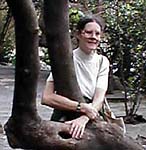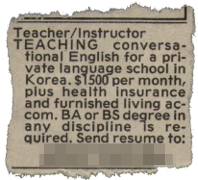
ABOUT: A few more or less random topics relating to ATESK. TIMELINESS: Korea and hagwon teaching have changed massively since Margaret's gig. We've tried to keep those sections fairly up to date, but our last Korean visit was in 2014. For more current information, you might try Dave's ESL Cafe, or one of the other gathering places on our links page. The photo album is a mixture of back-then and almost-now. Margaret's journal is exactly as she wrote it from February 2000 to February 2001. HISTORY: This story actually begins in 1999. Margaret wes fed up with her job, and started looking for something better. "Don't settle for just anything," I said. "Keep looking. Eventually you'll find a job you'll really like." Back then
Margaret had 20 years of interest in Korea, studying Korean in college, and sponsoring a low-income Korean child for a while. How about that? She'd found a job that she'd really like. My "English Teaching Korea" web search turned up unsettling stories of hagwon teaching: broken promises, run-down housing, unheated classrooms, loony directors, unpaid salaries. So: "Are you sure?" She was. Her intuition was better than mine. The hagwon's founder's wife's brother (following all that?) lived about an hour from us. He's the one who'd placed the newspaper ad. Margaret met him at a nearby chain restaurant. A few days later she had a phone interview with the hagwon's director. Another few weeks, and I dropped her off at the airport. IN KOREA: Margaret's a go-with-the-flow type. You have to be when - let's be honest - your control over the situation is pretty much limited to stay or leave. She trusted hagwon director Mrs Kim to look after the hagwon's investment in her. She also had a strong advocate in the hagwon's founder's wife Mrs Lee, who'd lived in the US and understood what it was like to be in an unfamiliar place. Was Margaret lucky to walk into such a good situation? Sure, but I also think that her positive attitude put the people around her on her side. She traveled Korea and met Koreans, and it was just about all good. Maybe that's a lesson for the more-cautious rest of us.I'm not saying that South Korea is Utopia. It's crowded and noisy. The air pollution in the big cities is some of the world's worst. It's not a great place to be if you're gay or black. And there's a lunatic despot up North. But for Margaret, it was friendly and welcoming. Teaching there was one of the best jobs she had. To this day, she still has friends there. AND YOU? The key to being happy in Korea - and to them welcoming you - is to respect Korea and Koreans for what they've accomplished in the world. You can be proud of your own country, but America-first flag waving isn't going to make you popular. You need to leave that at home. Here are a few qualities that I think make for friendship and teaching success.
It's not for everyone, but it might be for you. AND US? Margaret and I both grew up in the 1960s and 70s. The era partly shaped how we see the world. We were also almost a full generation older than most people who teach ESL in Korea. We'd already been outside the USA, so we knew that international travel was inspiring and eye-opening, and not really all that tough. What Korea showed us is that living overseas isn't much more difficult than travel overseas. So after we were done with our US working lives, retirement in France was a natural decision. That's where we are now. PRIVACY: Somehwere I read that that every website should have a privacy statement. Here's ours. Privacy is a Good Thing®. ATESK doesn't feed you cookies, track you, or collect any personal information from you. Nothing gets sent to your computer or internet gadget unless you ask for it. ATESK is 100% non-commercial, save for the offsite search engine, which may show you ads. That search is provided by Freefind. Here's their privacy policy. They don't put any tracking scripts on our pages. However, if you search for something, Freefind will serve the results, and I can't guarantee that they won't track you. TERMS AND CONDITIONS: I read that we're supposed to have this too. Therefore: ATESK is presented to you newborn-baby-naked and as-is, without any warranty whatsoever, be it expressed, implied, or statutory. Your use of ATESK is solely at your own risk. We're not responsible for the content of other sites we link to, or for your computer if you read something outrageous and spew coffee on your keyboard. If something offends or upsets you, you have the right to close your browser. REPRODUCTION: Not something you discuss with Planned Parenthood, but rather our policy on the text, images, and audio here. Copyright is kind of hopeless on the web, where anyone can right-click and say "save." We're a little left of center anyway, so we go with copyleft. Specifically, Creative Commons BY/NC/SA 4.0.
LINKING: You're welcome to link to our pages for nonprofit, noncommercial, public information purposes. I'll try not to change their URLs. If you link to a page, I'd appreciate it if you'd also link to the homepage. FINANCIAL: ATESK is a time capsule of the web in its youthful innocence. Back then we all thought that this small-d democratic new medium, where anybody could publish, would save the world from nasty predatory corporate-managed media. So it goes. But we remain stubbornly non-commercial, informational, and educational. We make no money from ATESK. I pay the domain name and hosting costs.TECHNICAL: ATESK is Web 1.0 because Web 2.0 tends to be heavy on style and light on content. It should be viewable with any browser written since about 1997. Sorry it's not very squinty-little-screen friendly, but when I wrote most of it, those gadgets hadn't been invented yet. |
 it still made sense to look for work in the newspaper classified ads. That's where
she found an invitation: "Teaching conversational English for a private language school in Korea.
$1500 per month, plus health insurance and furnished living accom. BA or BS degree in any discipline is required."
it still made sense to look for work in the newspaper classified ads. That's where
she found an invitation: "Teaching conversational English for a private language school in Korea.
$1500 per month, plus health insurance and furnished living accom. BA or BS degree in any discipline is required."